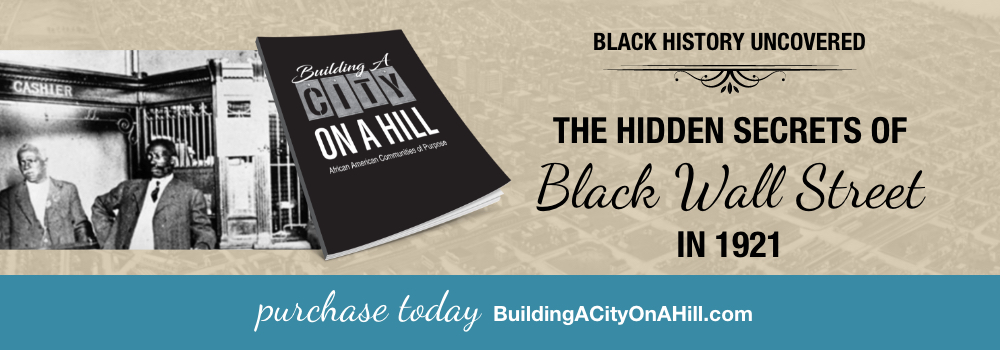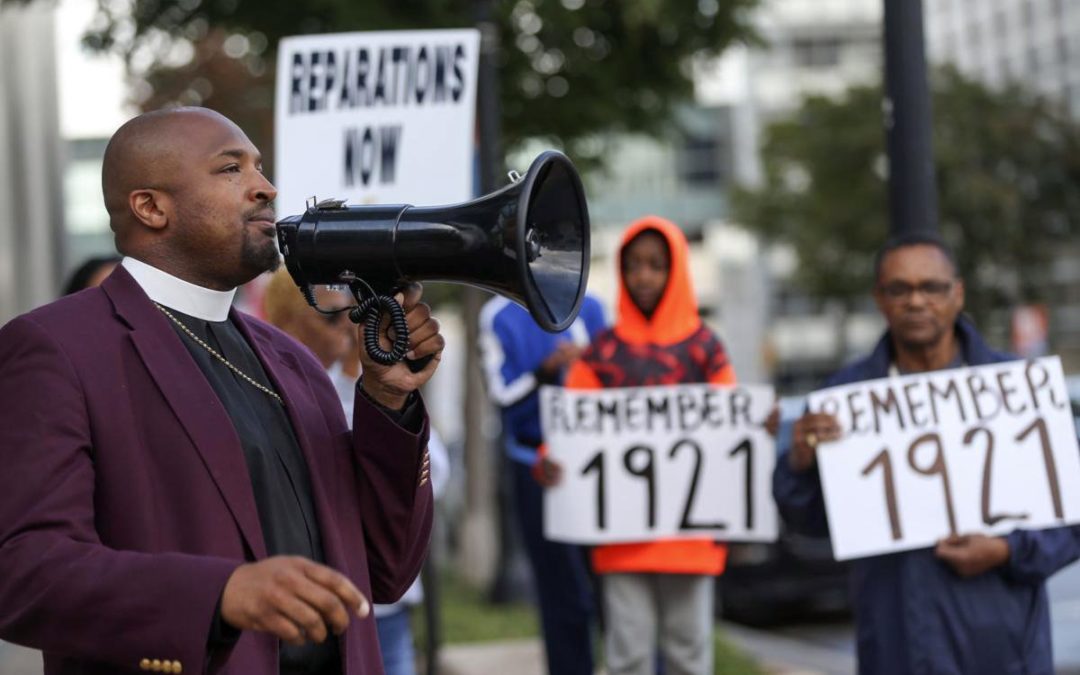
100 years later, Black church leaders seek reparations for Tulsa massacre
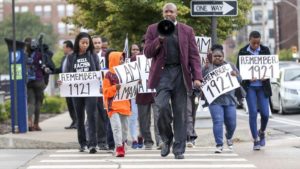
(RNS) — On the first Wednesday in May, as the centennial of the Tulsa massacre approached, the Rev. Robert R.A. Turner stood outside Tulsa City Hall with his megaphone, as he does every week.
“Tulsa, you will reap what you sow and that which you have done unto the least of these my children, Jesus said, you have done also unto me,” said Turner, 38, the pastor of Historic Vernon African Methodist Episcopal Church, captured on a video posted on Facebook.
“We come here to say, for your own benefit, you ought to do reparations not tomorrow, not even next week, not next month, not next year, but we demand reparations now!”
Turner’s Vernon AME is one of the plaintiffs in a suit filed in September that calls for the city of Tulsa and other defendants to pay reparations to relatives of victims and survivors of the May 31, 1921, massacre that destroyed a part of town known as “Black Wall Street.”
Beginning with false rumors spread though the Oklahoma city that a young Black man had assaulted a white female elevator operator, within about 16 hours, a white mob killed an estimated 300 Black people and destroyed thousands of homes, businesses and churches.
As Tulsa pauses to mark the somber centenary in its Greenwood district, where Black Wall Street was located, Turner and other Black people of faith are among those saying the time has come to repay as well as to remember.
The lawsuit argues that the tragedy is a continuing “public nuisance” that Tulsa should remedy through monetary means.
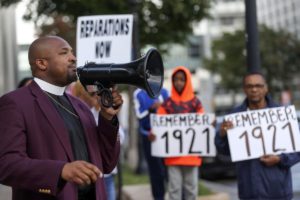
Among the suit’s petitions to the Tulsa County District Court are payments to descendants of those who were killed, injured or displaced by the massacre; development of educational and mental health programs for individuals and organizations in Greenwood and North Tulsa; and a scholarship program for “Massacre descendants” for post-secondary education in Oklahoma.
The suit states that Vernon AME Church, “founded in 1905, is the only standing Black-owned structure from the Historic Black Wall Street era and the only edifice that remains from the Massacre. Vernon’s sanctuary burned in the Massacre. The basement was the only part of the red brick building that remained.”
The church joins other plaintiffs in charging that they never received resources to recover from the trauma and damage of the massacre.
The city, responding in court documents to the suit, questioned the framing of its claims and the idea that the city’s current problems can be attributed to 100-year-old wrongs.
“At its base level, Plaintiffs are attempting to seek reparations for the events of June 1921 while working around the inherent statute of limitations problems that have thwarted other lawsuits bringing similar claims,” the city argued.
It added that the suit’s claims of continuing racial inequalities are “nebulous” and said “community wide issues such as racial disparity are caused by a number of factors and cannot be traced to specific actions or omissions to act of or by the City, nor is it a nuisance that can be simply abated by the City.”
In 2001, the Oklahoma Commission to Study the Tulsa Race Riot of 1921 called for reparations for the massacre, including payment to survivors and descendants, a scholarship fund, establishment of an economic development zone in the historic area, and a memorial for reburial of remains of victims found in unmarked graves.
“Perhaps this report, and subsequent humanitarian recovery events by the governments and the good people of the state will extract us from the guilt and confirm the commandment of a good and just God — leaving the deadly deeds of 1921 buried in the call for redemption, historical correctness, and repair,” wrote then-state Rep. Don Ross in the prologue of the report.
Turner, who arrived in the city in 2017 to lead his church, agrees with all of the commission’s recommendations and hopes for a full criminal investigation. His petition for reparations has been signed by more than 26,000 people.
“This is about sin and an abominable sin — racism,” said the minister, who calls the massacre a “genocide of people simply because of the color of their skin.”
Gregory Thompson, co-author of a new book, “Reparations: A Christian Call for Repentance and Repair,” said the Tulsans’ demands show how the movement for reparations has extended beyond atonement for the United States’ involvement in slavery to repairing societal ills, and that not just the federal government but local and regional officials are being called to account.
“It’s not to say that I don’t think the federal government should be involved — I do,” said Thompson, a white scholar who directs Voices Underground, a team of researchers and community members focused on the history of the Underground Railroad in the Philadelphia area. “But I think community-based reparations allow African American leaders a lot more agency in this conversation than if it’s located at the federal government, which is not equitably representative of African Americans.”
Regional reparations initiatives have become more common of late. Since the 1990s, descendants of survivors of the 1923 massacre in the majority-Black enclave of Rosewood, Florida, have received state scholarships.
In March, the Evanston City Council, in Illinois, began approving reparations that provide mortgage and other housing assistance to local Black residents to make amends for racially discriminatory housing practices. In April, Virginia Gov. Ralph Northam signed a bill mandating that five of the state’s older public universities pay for scholarships or community redevelopment programs, starting in 2022, to benefit descendants of enslaved workers who built them.
Vernon AME is one of 23 churches in Greenwood that predate the massacre, of which 13 survived, according to a tally by Faith Still Standing, an ecumenical group of congregations that have rebuilt in the area or beyond it.
The Rev. Robert Givens pastors Christ Temple Christian Methodist Episcopal Church, a congregation that was founded in Greenwood but has since moved. Its original building was still new when it was destroyed in the massacre.
“When we think of Black Wall Street, it was tremendously a thriving area of all-Black businesses,” said Givens. “So a lot of the churches were just now getting started in that area” when they were burned down.
“Nothing was ever done for them or to help them in that situation,” said Christ Temple’s trustee board chairperson, Annette Gathron, of the people who lost homes, businesses and belongings along with their churches.
Some of those whose families survived the massacre have become key figures in the city’s Black history. The late John Hope Franklin, the famed historian, was a member of Christ Temple, and his father, attorney B.C. Franklin, helped pay off the church’s mortgage on the brick building it constructed after the massacre.
Gathron said she hopes to attend some of the worship services marking the centennial.
A ” Unity Day Worship Guide ” for congregations to use on the last Sunday in May is included in an online list of options for commemorative activities.
Gathron said she also intends to keep younger members of her family aware of the history of the city where she has lived for more than 60 years.
“I think that it’s good that we are remembering and I plan to take my great-grands to some of this so they can understand the struggles that we have had,” she said.
She traditionally takes nieces and nephews visiting from across the country on a walking tour through historic Greenwood, including a stop at Vernon AME.
“I think it’s important for them to know that they can achieve because this, at one time, was a very thriving community.”
On May 31, Tucker’s 130-member church, which opened in a rebuilt sanctuary in 1928, plans to dedicate “a prayer wall for racial healing” that will include an exterior wall of the basement that survived 100 years ago.
Once built, Turner hopes it will draw people of all faiths and none for prayer and meditation. “The idea behind it is to have people of all nations come and to pray and talk to God to help us with this racial healing that we need in the world,” he said.
You can hear from Pastor Robert Turner alongside other leaders virtually tonight (June 2, 2021) at Friendship West Baptist Church in Dallas, TX as they commemorate the Tulsa Race Massacre of 1921 in A Sankofa Moment. Conversation will also feature Nancy St. Jacobs, VP of Community Business Development for Truist Bank, and Lamar Tyler, Founder of Traffic Sales & Profit moderated by Dr. Frederick D. Haynes III.

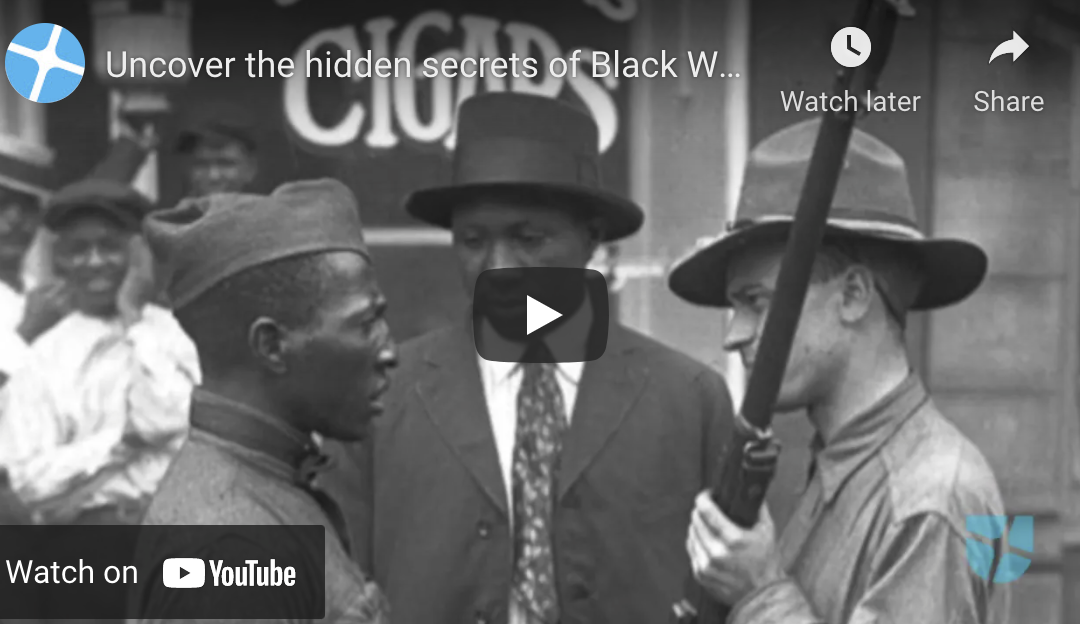
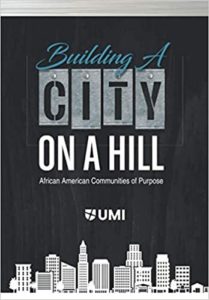
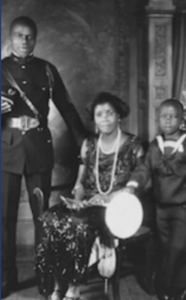 In this case, when it came to a white woman’s accusations, punishment meant death, and knowing her scream was a likely death sentence, young Rowland ran away. He was later seized and apprehended with the intent of being lynched. Word of a Black man raping a defenseless white girl spread throughout the Tulsa area. Dozens and then hundreds of white men grew to a mob of over 2000 white men gathered at the County courthouse demanding justice. But justice for what? Sarah Page wasn’t assaulted, her clothes weren’t ruffled, and though her story wavered during questioning, she ultimately affirmed she was not harmed.
In this case, when it came to a white woman’s accusations, punishment meant death, and knowing her scream was a likely death sentence, young Rowland ran away. He was later seized and apprehended with the intent of being lynched. Word of a Black man raping a defenseless white girl spread throughout the Tulsa area. Dozens and then hundreds of white men grew to a mob of over 2000 white men gathered at the County courthouse demanding justice. But justice for what? Sarah Page wasn’t assaulted, her clothes weren’t ruffled, and though her story wavered during questioning, she ultimately affirmed she was not harmed.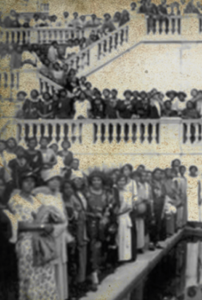 And there you have it, fake news. But the damage had already been done, and the wheels were set in motion. Armed Black World War 1 veterans were among the less than 100 members of the Greenwood community who came to prevent another lynching of a Black man, as thousands had been lynched since the generation of reconstruction. A verbal confrontation led to a shot being fired, triggering what would soon become the bloodiest racial conflict in American history. Some 500 members of the white mob were armed and deputized by city officials, and those who didn’t own weapons looted stores to obtain guns and ammunition along the way. Thousands of angry white men descended upon “Little Africa” as a few white families provided sanctuary to those fleeing from violence.
And there you have it, fake news. But the damage had already been done, and the wheels were set in motion. Armed Black World War 1 veterans were among the less than 100 members of the Greenwood community who came to prevent another lynching of a Black man, as thousands had been lynched since the generation of reconstruction. A verbal confrontation led to a shot being fired, triggering what would soon become the bloodiest racial conflict in American history. Some 500 members of the white mob were armed and deputized by city officials, and those who didn’t own weapons looted stores to obtain guns and ammunition along the way. Thousands of angry white men descended upon “Little Africa” as a few white families provided sanctuary to those fleeing from violence.